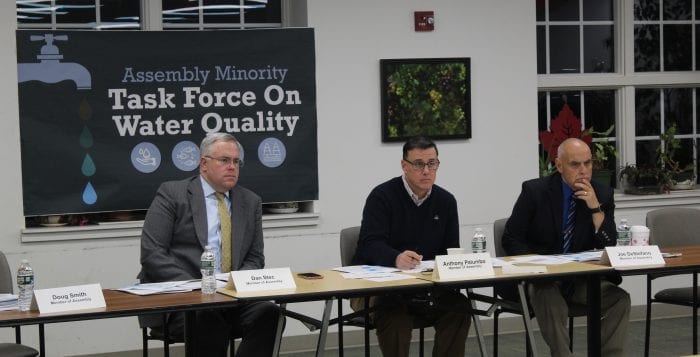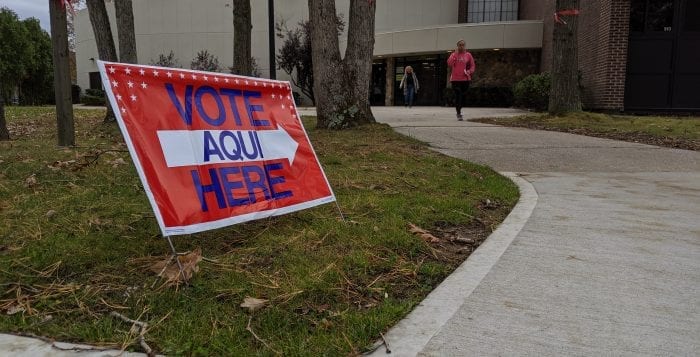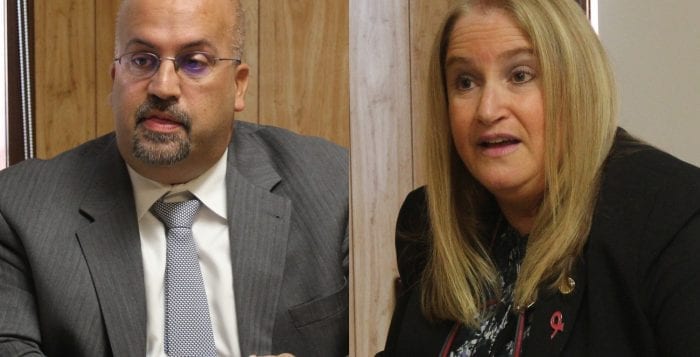The New York State Assembly Minority Task Force on Water Quality hosted an informational forum at the Mount Sinai Rose Caracappa Senior Center Nov. 19 to discuss the condition of the state’s water sources, address emerging contaminants and prioritize and fix aging infrastructure, but some environmental activists disagree with the officials positions.
State assemblymen Anthony Palumbo (R-New Suffolk), Joe DeStefano (R-Medford) and Dan Stec (R-Queensbury), took feedback from community members, stakeholders, environmental experts, among others to assist the group in its efforts to develop long-term solutions to those issues.
“If we had a different model that said that the use of the water should be returned to nature as clean as we got it [then] we wouldn’t have this problem — and present model.”
— Kevin McDonald
“We all know how important water is — we are here to listen and learn,” DeStefano said. “Hopefully we can have a spirited conversation on the things that are important to you and what we need to do to make those things come to fruition.”
Adrienne Esposito, executive director of Citizens Campaign for the Environment, said Long Island and the state is in a better place than it was five years ago but acknowledges there’s still work to be done.
“Let’s go to some facts here. We need to treat our sewage in 2019, as you’ve heard we don’t necessarily do that on Long Island,” she said. “Close to 400,000 are still on outdated septic systems which is virtually untreated sewage.”
Esposito brought up harmful algal blooms that are being found throughout Long Island’s coastal waters. She said due to increased nitrogen concerns, which leaks into the local waterways through outdated septic systems and from fertilizer, as just two examples, these algae blooms are spreading to other parts of the state.
“It is killing off the shellfish industry — people are calling us asking why their water looks like coffee,” she said.
Palumbo agreed the main issue was excess nitrogen.
“What would you attribute for all the increase in algal blooms and water quality issues?” Palumbo asked. “You could say it is a direct result of excess nitrogen because it’s ‘Miracle-Gro’ essentially that makes this grow at such an alarming rate. It’s a concern for me because clearly nitrogen has been the boogeyman.”
Esposito also mentioned blue green algae being found in all parts of the state, including the Albany drinking reserve, which attacks the liver and could potentially cause liver failure.
The executive director praised Suffolk County’s septic improvement program, saying residents need to replace their old septic systems with new technology, though at the same time current sewage treatment plants don’t treat volatile organic chemicals, 1,4 dioxane, pharmaceutical drugs, pesticides or chemicals found in hair products.
“It’s going to take time and money, but what plan does not take time and money?” she asked.
A number of local residents disagreed with scientists’ findings, with a few skeptical of the recent nitrogen findings on Long Island, one calling it “a naturally functioning
occurrence.”
One resident criticized a map from the Center for Clean Water Technology at Stony Brook University showing the impacts of sewage pollution and blue green algae.
“It has been overstated and overexaggerated. We have looked at the data over the last five years and there is no trend of increase in nitrogen,” he said.
Kevin McDonald, conservation project director of The Nature Conservancy, on the other hand said we have to reduce nitrogen use.
“Close to 400,000 are still on outdated septic systems which is virtually untreated sewage.”
— Adrienne Esposito
“It’s a global problem, it’s a national problem, it’s a regional problem. Any rational person would say in a place as populated as Long Island, it is probably a problem as well,” he said.
Similarly to Esposito, McDonald criticized how the county treats water.
“If we had a different model that said that the use of the water should be returned to nature as clean as we got it [then] we wouldn’t have this problem — and present model,” he said. “Instead we can use how you want, pollute and dump it back into the environment.”
In 2014, Suffolk County asked IBM to look at how it could treat water better and manage a water system for the 21st century. McDonald said the corporation told the county to treat water delivery and treatment as a single concept.
He said the current model is based on selling as much water as it can.
“That’s how we have the problem we have now, part of the mess is from us and we have to fix it,” McDonald said.















